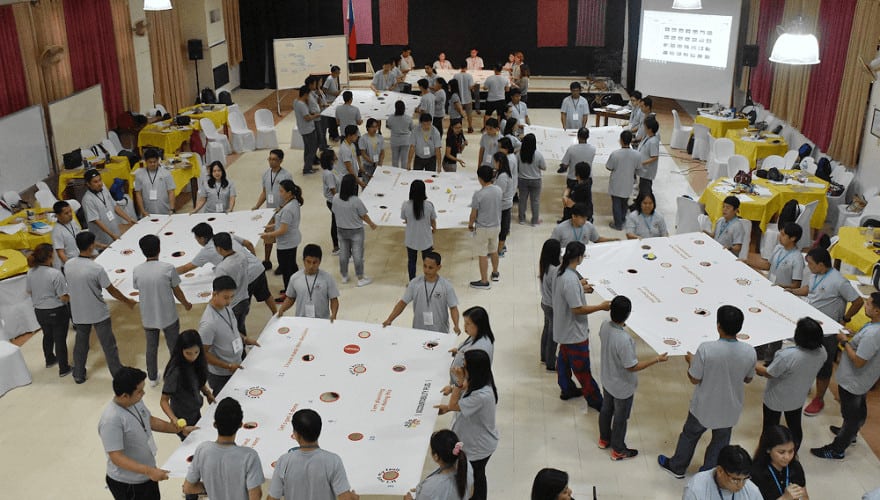I still remember my first official paycheck. The envelope felt thick, the numbers looked big, and for a moment, I thought: “This is it. I’ve made it.”
But the thrill didn’t last long. By the time I set aside money for jeepney fare, food, rent, and a few family needs, the envelope was empty. I had worked the whole month, yet I had nothing left to move me forward.
That’s the quiet heartbreak many Filipino youth experience in their first jobs. The pride of earning your own money collides with the shock of how little it actually covers. And this first experience matters more than we think—it shapes how young people see their future, whether they will stay, whether they will hustle harder, or whether they will look abroad.
Minimum wage isn’t just a number on a wage order. For the young Filipino, it’s a signal. It tells you whether your country values your effort, whether your employer sees your potential, and whether you’ll be forced to survive—or encouraged to build.
TL;DR: Youth and Minimum Wage in the Philippines
- First jobs matter. For many youth, they begin at minimum wage—₱600/day in NCR, ₱400+ in provinces.
- Minimum wage = survival. It covers fare, food, and little else.
- Living wage = dignity. It allows savings, education, and a future.
- Low wages shape choices: stay stuck, job-hop, or migrate abroad.
- The real payoff isn’t just the first salary but the first shift—building skills, ownership, and courage to play the right game.
- 👉 Your first paycheck doesn’t define your ceiling. It defines your starting point.
What Minimum Wage Means for the Young Filipino
In the Philippines, minimum wage varies by region. A fresh graduate working in Metro Manila might earn a little over ₱600 a day. In provinces, it can be closer to ₱400. On paper, that’s protection against exploitation. In practice, it often feels like the bare minimum to get by.
For young people, these numbers hit differently. This is their first taste of independence. Their first attempt to stand on their own. For many, it’s also the first time they realize that hard work doesn’t automatically mean progress.
When you’re young and full of hope, the paycheck is supposed to be a springboard. But if it only covers fare, lunch, and a few bills, it becomes a treadmill—motion without movement.
I’ve seen students graduate with big dreams, only to shrink them within weeks of entering the workforce. They start calculating: “If this is what I’ll earn, should I stay in this field? Should I move abroad? Should I find a sideline just to keep up?” The minimum wage doesn’t just shape budgets. It shapes choices.
And that’s why the first paycheck matters. It’s not about how much you take home—it’s about what it teaches you. Does it say “Keep surviving”? Or does it whisper “You can build more”?
The First Job Experience: Survival or Springboard?
Ask any fresh graduate about their first job and you’ll hear two kinds of stories.
One is the survival story. A young cashier earning minimum wage counts coins just to get home after her shift. Her pay covers fare, lunch, and a little extra for phone load. By the second week, she’s borrowing from friends. She tells herself, “At least I have a job.” But deep down, she wonders if this is all her degree was for.
The other is the springboard story. A call center agent starts with a salary slightly above minimum. It’s not luxurious, but it’s enough to pay rent, support siblings, and save for a certification course. Within two years, she’s promoted. Within three, she’s earning triple what she started with. The first job became a launchpad.
The difference between these stories isn’t just luck. It’s the invisible game youth are pulled into.
In Start With One Shift, I wrote about three games:
- The Conventional Game: play safe, stay busy, wait for rewards that may never come.
- The Brave Game: hustle hard, say yes to everything, burn out before you break through.
- The A-Game: design smarter moves, multiply value, and play for freedom—not just survival.
Most minimum wage jobs push young workers into the first two. They either get stuck in safety or sprint into exhaustion. But the real challenge is to use even a low-paying first job as training for the A-Game.
Your first job will not define your future, but it will define your habits. If you treat it as a paycheck only, you stay trapped in survival. If you treat it as practice—building skills, learning discipline, making connections—it becomes a springboard.
The paycheck might look the same, but the payoff is completely different.
How Wages Shape Career Choices
The size of the first paycheck does more than cover bills. It whispers choices into the ears of the young.
Some accept it as normal. They stay in their first jobs for years, grateful to have steady work, even if it means stretching pesos to survive. Their careers become built on patience—waiting for annual increases, promotions, or luck. This is the Conventional Game in action: staying visible but not really moving.
Others move fast. They jump from one employer to another, chasing slightly higher pay. A ₱500 increase is enough to switch jobs. Over time, this creates a patchwork résumé but not necessarily a career. It feels like movement, but often it’s just motion in circles.
And then there are those who see the gap early and make bolder moves. They invest in skills, certifications, or side hustles. They treat the first paycheck not as a verdict but as a wake-up call. For them, the minimum wage doesn’t dictate their ceiling—it motivates them to build their own ladder.
I’ve seen this firsthand. Some of my students, after graduation, entered jobs that barely paid for their daily commute. At first, they complained. But a few shifted their mindset. They said, “If the job won’t pay me in pesos, I’ll let it pay me in practice.” They squeezed every bit of learning out of the experience—communication, teamwork, leadership—and later used those skills to leap into better opportunities.
The truth is, wages shape not only your bank account but also your appetite for risk. If your first paycheck barely feeds you, do you dare dream bigger? Or do you settle early, telling yourself, “This is just how life is”?
This is why minimum wage debates matter so much for the young. Because the first salary doesn’t just cover today’s needs—it frames tomorrow’s choices.
👉 Motion keeps you busy. Real movement builds your future. And your first job teaches you which one you’re playing for.
The Migration Question – When Minimum Isn’t Enough
For many young Filipinos, the first paycheck is also the first nudge toward migration.
The logic is simple. If minimum wage here can’t cover a decent life, maybe higher wages abroad can. The stories circulate fast: a cousin in Dubai sending money for a new tricycle, a friend in Japan who doubled her earnings in a year, a classmate in Canada who posts photos of a bigger apartment. These stories plant a quiet seed: “Maybe I don’t belong here. Maybe my worth will be recognized somewhere else.”
I met a call center agent once who had worked just two years in Manila. Her pay was better than minimum, but the stress was heavy and the savings were thin. She left for Dubai, took a lower-status job at first, but in her mind it was progress—because the numbers told her so. Her decision wasn’t only about salary. It was about dignity.
This pattern isn’t new. For decades, the Philippines has relied on migration as a safety valve. But what’s striking is how early the idea starts. Some students already plan their exit before graduation. For them, the first paycheck at home isn’t a milestone. It’s a test—and if it fails, they choose elsewhere.
The question we must ask is sobering: are our first jobs preparing young people to build here, or are they quietly training them to leave?
Minimum wage jobs often pay enough to survive, but not enough to dream. And when youth can’t dream here, they’ll look for a country that lets them.
👉 When minimum wage becomes the ceiling, migration feels like the only open door.
The Motivation Gap – When Wages Drain Drive
At the start, young people enter the workforce with fire. They dream of proving themselves, helping their families, and building a better life. But that fire dims quickly when reality sets in: long hours, small pay, bigger bills.
The math is discouraging. A week’s worth of effort disappears in a single grocery trip. Overtime doesn’t mean growth—it just means slightly less debt. And soon, the excitement of the first job shifts into resignation.
Psychologists call this the erosion of intrinsic motivation. I call it the motivation gap—the space between effort and reward. When effort is high but reward stays low, energy leaks out. You keep working, but with less heart. You show up, but only halfway alive.
I’ve spoken to young employees who admit, “Sir, why will I give extra if my pay is still the same?” It’s not laziness—it’s survival math. When the paycheck doesn’t stretch, neither does their motivation.
And yet, I’ve also seen the opposite. Some youth treat minimum wage as fuel. They say, “This can’t be my future, so I’ll push harder.” They enroll in night classes, build side hustles, or save for certifications. They turn the frustration into fire.
This is the paradox of the motivation gap. For some, it breaks their spirit. For others, it breaks their limits.
The difference often lies not in the size of the paycheck, but in the shift of perspective. In Smart Work, I wrote that busyness without leverage leads to burnout. Minimum wage jobs without a growth plan drain ambition. But minimum wage jobs paired with learning, ownership, and vision can spark resilience.
👉 The paycheck may not always motivate, but the meaning behind it can. The challenge for youth is to find meaning before motivation runs dry.
Beyond Pay: What First Jobs Really Teach
Wages matter—but they’re not the only payoff of a first job. Sometimes, what you earn in pesos is far less important than what you earn in practice.
First jobs teach discipline. You learn to wake up early, commute through traffic, and show up even when you don’t feel like it. They teach resilience—how to deal with a difficult boss, a rude customer, or a mistake that costs the company. They teach teamwork—learning to work with people older, younger, or completely different from you.
These lessons don’t show up on payslips, but they show up in character.
I’ve seen fresh grads discover hidden strengths when they least expected it. One told me, “Sir, I thought I was weak, but after six months dealing with angry customers, I realized I could stay calm under pressure.” That’s a skill no one can take away.
But here’s the danger: when wages never match growth, lessons turn into resentment. A worker who learns discipline but feels undervalued may conclude, “Why bother?” A youth who grows in resilience but sees no reward may start thinking, “This country doesn’t deserve my best.”
That’s why the real challenge is not just to survive your first job, but to use it as a launchpad. Even if the pay is minimum, the practice can be maximum—if you approach it with ownership.
In Work Like an Artist, I called this signing your work—treating every task, no matter how small, as if your name is on it. Minimum wage doesn’t have to mean minimum pride. If you give your best, you’re not just earning money—you’re building habits and a reputation that will outlast any paycheck.
👉 First jobs may not always pay in pesos. But they can pay in practice, and practice compounds into freedom.
Employers’ Role in Shaping Youth Futures
Every fresh grad who walks into a company brings more than a résumé. They bring hope. They bring trust. They believe this organization will give them not just a job, but a future.
That’s why the way employers treat young workers matters so much. First jobs become the filter through which youth see the world of work. If the message is, “Do the bare minimum, get the bare minimum,” then young people learn to give just that. But if the message is, “Your work matters, and so do you,” then they rise higher.
I’ve seen companies pay only the minimum, then complain about turnover. They ask, “Why don’t young people stay loyal anymore?” The answer is simple: loyalty can’t grow where dignity is absent. When the paycheck doesn’t even cover survival, employees don’t see a future. They see an exit.
But I’ve also worked with organizations that invest differently. They may not always match global salaries, but they create programs that lift youth—mentorship, training, scholarships, wellness benefits. Some even design profit-sharing or recognition systems that tell young workers, “You’re not just a number here. You’re part of the story.”
In Smart Work, I emphasized that systems create culture. Employers who build systems that support growth—fair pay scales, clear promotion paths, leadership development—don’t just keep employees. They multiply their energy.
Here’s the truth: companies that insist on minimum wage end up paying more. They bleed through constant hiring, retraining, and mistakes from disengaged staff. But those that invest closer to a living wage—and surround it with systems of growth—create a culture where people stay, grow, and give their best.
👉 Employers don’t just hand out paychecks. They shape futures. And the kind of future they shape depends on whether they settle for minimums or design for dignity.

What Students and Fresh Grads Can Do – Start With One Shift
The first paycheck might disappoint you. But your response to it can define your future. You don’t control the minimum wage, but you do control how you play the game.
Here are four shifts that can turn a low-paying first job into a launchpad:
Shift 1: See the First Job as Training, Not Destiny
Don’t confuse your starting point with your finish line. Your first job is practice—building habits, resilience, and reputation. Treat it as training camp for the future you want.
Shift 2: Build Skills That Multiply Your Value
Every task is a chance to learn something transferable—communication, problem-solving, teamwork. In Start With One Shift, I wrote: skills compound like savings. Even small skills today can double your worth tomorrow.
Shift 3: Treat Side Hustles as Experiments, Not Distractions
Most young workers already have sidelines. Instead of random hustling, design them as experiments. Try, fail, learn. A sari-sari store, a freelance gig, a digital project—all can be stepping stones if approached with intention.
Shift 4: Learn Ownership Early—Sign Your Work
In Work Like an Artist, I talk about “signing your work.” Whatever you do—whether it’s answering calls, filing documents, or creating reports—put your name on it. Ownership builds trust. Trust builds opportunities.
These shifts don’t require policy changes or employer permission. They require courage. The courage to see minimum wage not as your ceiling, but as your starting block.
👉 Your first paycheck may not pay for your dreams. But your first shift can start building them.
What Families and Schools Can Do
No young person builds a future alone. Behind every worker is a family, a school, and a community that either lifts them or holds them back.
Families: Support, Not Pressure
Many fresh grads hand over their first paycheck to parents with pride. But when the expectation becomes, “Ikaw na ang bahala sa lahat,” pressure replaces encouragement. Families can shift the script by seeing the first job as a learning stage, not a financial lifeline. Support your children’s growth, not just their income. Ask: “What skills are you learning? How can we help you invest in your future?”
Schools: Teach Skills, Not Just Subjects
Diplomas don’t guarantee dignity. Too many graduates enter the workforce with theoretical knowledge but little practice in problem-solving, communication, or creativity. Schools must align lessons with employable skills, internships, and projects that mirror real work. A student who knows how to learn, adapt, and lead will never stay stuck at minimum wage for long.
Mentors: Guide the Long Game
Youth often see the paycheck as the final measure of success. Mentors—whether teachers, supervisors, or community leaders—can reframe this. Share stories of starting small but building big. Show how every early job is raw material for a stronger future.
When families, schools, and mentors work together, they give young workers something minimum wage can’t: hope. And hope, when guided by wisdom, becomes courage.
👉 The goal isn’t to protect youth from struggle. The goal is to prepare them to rise from it.
Policy Perspective – Minimum Wage for Youth in Context
When wage boards set the minimum wage in the Philippines, they rarely ask a crucial question: “How does this affect the youth entering the workforce for the first time?”
Youth are often lumped into the same category as older workers, even though their realities differ. They carry student loans or family obligations, yet they’re also at a stage where career foundations are being built. The first few years can either anchor them here or push them away.
The Challenge with Current Policy
- Wage boards focus on inflation, regional disparities, and business viability.
- They rarely factor in the psychological and long-term impact on young workers.
- This results in a policy that ensures compliance but not growth.
Possible Reforms for First-Time Workers
- Apprenticeship Wages with a Growth Path – Temporary lower rates paired with structured training and guaranteed increments after six months.
- Skills-Linked Pay – Wages tied to certifications or competency milestones, so young workers see progress as they learn.
- Government Support for First Jobs – Subsidies or tax breaks for companies that hire and train fresh grads, ensuring they aren’t penalized for inexperience.
Lessons from Other Countries
- Germany: Dual training systems combine classroom learning with paid apprenticeships, giving youth both income and skills.
- Singapore: No blanket minimum wage, but targeted “progressive wage models” ensure workers in key sectors earn enough while upgrading skills.
- Japan: Strong labor protections for young workers, plus clear pathways from entry-level to career advancement.
These examples show us something important: it’s not only about the amount on the payslip. It’s about designing pathways where the first job becomes a foundation for growth, not a dead end.
👉 Policy that ignores youth creates migration. Policy that invests in youth creates momentum.
Building Beyond the Minimum
The first paycheck is more than a slip of paper. It’s a signal. And right now, too many young Filipinos are receiving the wrong one.
For youth, the challenge is clear: don’t mistake your first salary for your future ceiling. Use every job as training, every task as practice, every peso as a reminder to build skills that multiply. Minimum wage may define your start, but it doesn’t have to define your story.
For employers, the challenge is urgent: recognize that minimum wage workers are not just labor—they are tomorrow’s leaders, innovators, and customers. Paying the minimum may keep your business alive, but investing closer to a living wage helps your business thrive. Remember: loyalty and dignity are built, not demanded.
For policymakers, the responsibility is heavy: stop treating wage increases as political tokens. Start asking what it really takes for a Filipino family to live decently—and design policies that give youth reasons to stay, not to leave.
Because in the end, minimum wage is survival. Living wage is dignity. And dignity is what turns effort into excellence, and jobs into futures.
👉 The first paycheck is not the finish line. It’s the invitation to play a bigger game. Don’t settle for survival. Build for dignity.
FAQs on Youth and Minimum Wage in the Philippines
1. What is the current minimum wage for fresh graduates in NCR?
As of 2025, the daily minimum wage in Metro Manila is around ₱610–₱620. For a fresh grad working six days a week, that’s roughly ₱14,000–₱15,000 a month before deductions.
2. Are entry-level wages different in the provinces?
Yes. Regional wage boards set rates based on local conditions. In some provinces, minimum wage is closer to ₱400–₱450 a day. While living costs are lower outside NCR, the gap between pay and real expenses still leaves many youth struggling.
3. Why do many young Filipinos leave the country after their first jobs?
Migration often starts with disappointment. When minimum wage barely covers survival, young workers begin comparing their situation with peers abroad. Stories of higher wages overseas become more persuasive when local jobs don’t allow them to save, support family, or dream beyond bills.
4. What should students focus on if their first job pays minimum wage?
Focus on skills more than salary. Communication, problem-solving, leadership, and ownership are currencies that outlast any paycheck. Use your first job as training ground. Build value that multiplies.
5. How can employers motivate fresh grads beyond pay?
Pay matters, but dignity matters more. Employers can add value through mentorship, clear promotion paths, training, recognition, and benefits like transport allowances or wellness support. These systems tell youth: “We see you, and we’re investing in your future.”
6. Is minimum wage enough to live on in the Philippines?
For most youth, minimum wage is survival pay, not living pay. Studies show a family of five in NCR needs around ₱1,100+ daily to cover food, rent, transport, and education. That’s almost double the minimum wage.
More Than a Paycheck
The story of youth and minimum wage is not only about pesos. It’s about possibility.
Your first paycheck will never be perfect. For many, it feels like a letdown—the realization that hard work doesn’t always equal big rewards. But that envelope is not the end of your story. It’s the beginning.
For students and fresh grads, the challenge is to see beyond the numbers. Don’t let a minimum wage job shrink your dreams. Treat it as training, practice, and preparation. Build skills that outlast salaries. Sign your work with pride. Play for dignity, not just survival.
For employers, remember: the youth you hire today are the leaders you will depend on tomorrow. Invest in them. Pay closer to dignity, design systems for growth, and they will repay you with loyalty and creativity no minimum wage can buy.
For families and policymakers, the responsibility is heavy but hopeful. Support young workers not just with demands, but with opportunities. Don’t design for survival—design for futures worth staying for.
Because in the end, the question is not “What does the first job pay?” The real question is “What future does it build?”
👉 The first paycheck is not your finish line. It’s your starting block. Use it to begin the shift from surviving to thriving.
If you want Filipino values to show up as real behavior at work…
Let’s turn it into a culture shift experience.
→ Shift Experiences
If your team is stuck in meetings, misalignment, or slow decisions…
Let’s design one shift they can use immediately.
→ Shift Experiences






